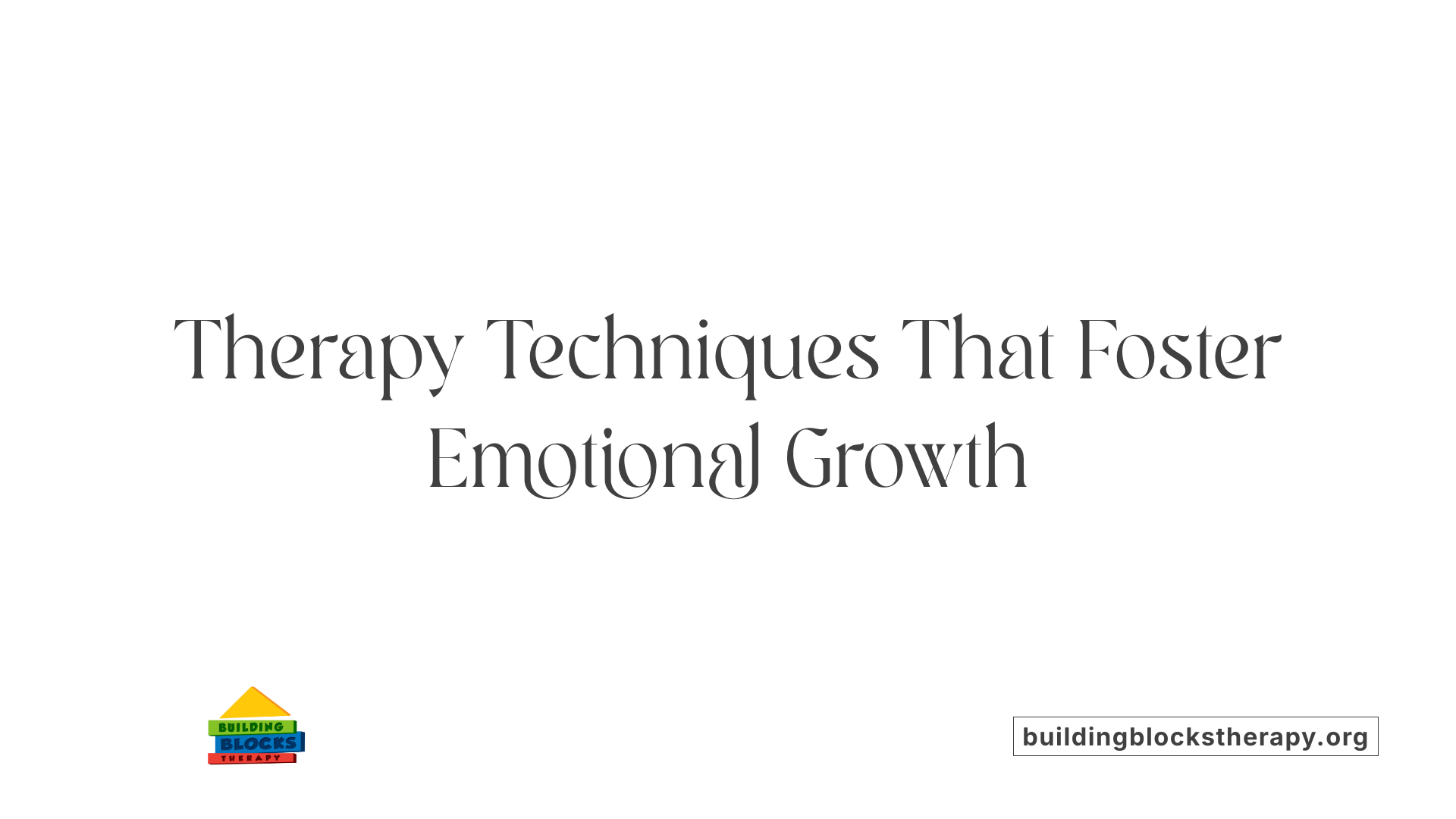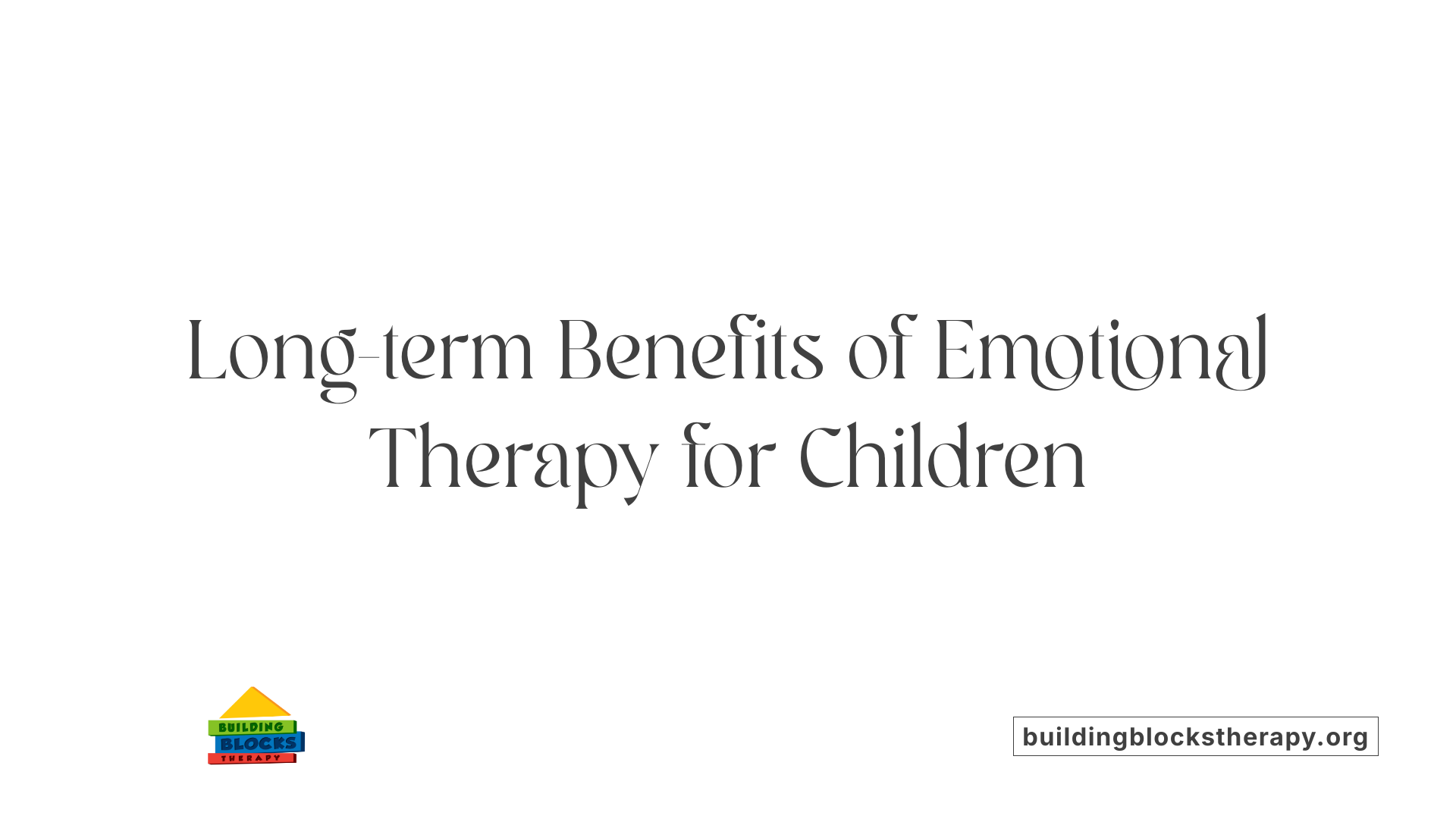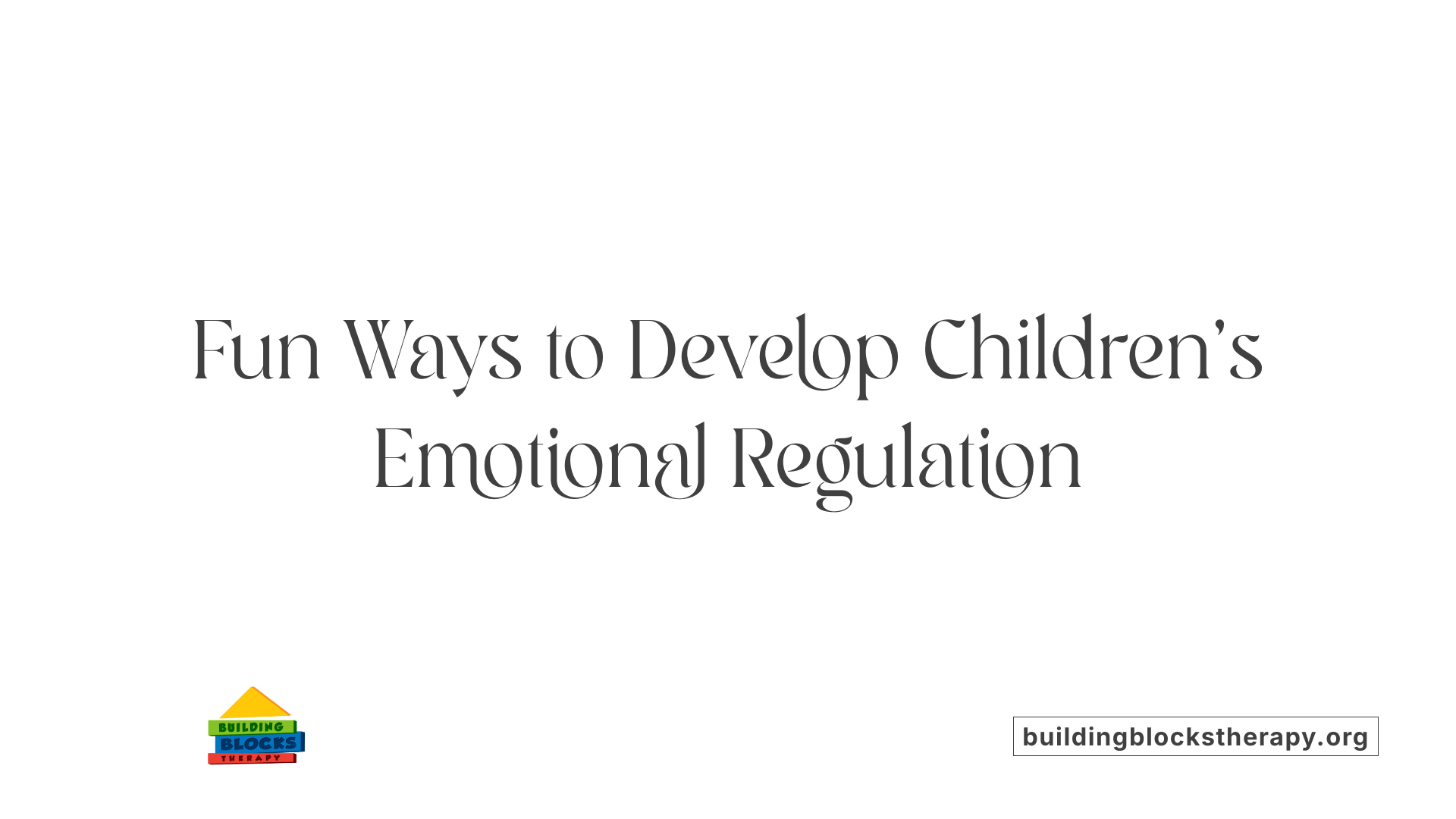Understanding the Role of Therapy in Developing Emotional Skills
Developing emotional regulation is a crucial aspect of childhood development, impacting social skills, mental health, and overall well-being. Therapy offers a range of evidence-based strategies to help children understand, manage, and express their emotions effectively. This article explores how various therapeutic approaches support emotional regulation, the benefits they bring, and practical ways caregivers and professionals can foster these essential skills.
How Therapy Supports Emotional Regulation Development in Children

How does therapy support emotional regulation development in children?
Therapy plays a vital role in helping children develop better emotional regulation skills. It provides a safe and structured environment where children can learn to recognize, understand, and manage their feelings effectively.
Evidence-based techniques like play therapy, mindfulness exercises, and cognitive-behavioral therapy (CBT) are commonly used. Play therapy, especially, allows children to express emotions through creative activities, storytelling, and play scenes, making it easier for them to process complex feelings such as trauma or fear.
Mindfulness practices teach children to stay present, acknowledge their emotions without judgment, and respond calmly. CBT helps children reframe negative thoughts, develop problem-solving skills, and practice new behaviors in real-life situations.
Structured programs such as the Zones of Regulation and the Rochester Resilience Project are designed to improve emotional awareness and self-control. These programs include activities that help children identify different emotional states, use coping strategies, and shift between feelings constructively.
Professional therapies like Dialectical Behavior Therapy (DBT) and Occupational Therapy (OT) focus on building essential self-regulation skills. DBT trains children in distress tolerance, emotional patience, and interpersonal effectiveness, which is particularly beneficial for youth with intense emotional experiences or borderline traits.
OT helps children develop sensory processing skills, emotional vocabulary, and coping mechanisms. Therapists utilize activities like movement, sensory play, and social scenarios to teach children how to respond to environmental inputs appropriately.
Importantly, parental involvement is a cornerstone of successful emotional regulation development. When caregivers model healthy emotional responses, validate children’s feelings, and participate actively in therapy, children gain confidence and clarity in managing their own emotions.
Creating a nurturing and responsive environment at home and school complements therapy, reinforcing learned skills. Consistent routines, positive reinforcement, and open communication help children internalize emotional management strategies.
Overall, therapy offers children practical tools and ongoing support to foster resilience, reduce emotional outbursts, and build healthier relationships. When combined with supportive caregiving, therapy significantly boosts children’s ability to navigate their emotional worlds confidently and calmly.
Benefits of Therapy for Children Facing Emotional Challenges

What are the benefits of therapy for children struggling with emotional regulation?
Therapy provides invaluable support for children who face difficulties in managing their emotions. It creates a safe and nurturing environment where children feel comfortable expressing their feelings without judgment. Techniques like play therapy utilize toys, art supplies, and storytelling to help kids recognize and understand their emotions better. This approach is especially effective in addressing trauma, anxiety, or behavioral issues, as it allows children to act out and process challenging experiences in a non-threatening setting.
Play therapy also helps develop emotional vocabulary, enabling children to identify and name their feelings more accurately. This foundational skill supports better communication of needs and emotions, fostering healthier interactions and relationships.
Evidence-based therapies such as cognitive-behavioral therapy (CBT) and dialectical behavior therapy (DBT) are tailored to teach practical strategies. These include mindfulness exercises, emotional reappraisal, and problem-solving techniques that children can apply in everyday life. Such approaches build resilience, improve impulse control, and enhance coping skills, equipping children to handle stress and emotional upheavals more effectively.
Addressing underlying issues like trauma, depression, or anxiety is crucial, as these can interfere with emotional regulation. Therapeutic interventions aim to resolve these root causes, promoting healing and emotional stability. Family engagement during therapy sessions further reinforces the skills children learn, fostering consistency at home and providing additional emotional support.
Long-term benefits of therapy extend beyond immediate emotional regulation improvements. Children become more adept at social interactions, demonstrating better conflict resolution, empathy, and cooperation. Their self-esteem flourishes as they gain confidence in managing their feelings. Resilience develops as children learn healthy ways to cope with setbacks and challenges, contributing positively to their overall mental health and well-being.
In summary, therapy offers a comprehensive approach that not only addresses current emotional challenges but also paves the way for healthier emotional development, stronger relationships, and a more confident, resilient outlook on life.
Understanding Emotional Regulation and the Role of Therapy
What is emotional regulation, and how can therapy help children develop this skill?
Emotional regulation refers to the ability to manage and respond to emotional experiences in a way that is socially acceptable and adaptable. It acts like a volume knob for feelings, allowing children to control the intensity and duration of their emotional responses. Developing this skill enables children to handle challenges, recover from setbacks, and maintain healthy relationships.
Throughout childhood, children learn to recognize, understand, and regulate their emotions. This process is influenced by multiple factors such as genetics, early environment, and the support they receive from caregivers. Caregivers play a crucial role through modeling appropriate emotional responses, providing a secure base, and engaging in co-regulation—an interactive process of helping the child manage their feelings.
Therapy can be a valuable tool in enhancing emotional regulation skills in children. Therapeutic approaches like Dialectical Behavior Therapy (DBT), Cognitive Behavioral Therapy (CBT), and play therapy teach children to identify their feelings, recognize emotional triggers, and develop coping strategies. Techniques such as mindfulness, deep breathing, and cognitive reappraisal empower children to pause, process, and modulate their emotions before reacting impulsively.
Parent involvement and family-based interventions are often incorporated into therapy to reinforce these skills at home and in daily life. For example, therapists may coach parents on how to describe feelings, praise positive emotional regulation, and maintain consistent routines. The goal is to create a supportive environment that fosters emotional awareness and builds resilience.
Practicing tools like mindfulness exercises helps children increase their awareness of internal sensations and emotional states. Reappraisal strategies encourage them to interpret situations differently, reducing negative emotional responses. Acceptance-based therapies teach children to tolerate distress without trying to suppress or avoid it.
Overall, therapy provides structured support and skill-building opportunities that help children manage their emotions effectively. This not only improves their current functioning but also promotes social competence, mental health, and overall well-being.
Developmental Stages of Emotional Regulation in Childhood
Children typically develop emotional regulation skills in stages, beginning with co-regulation in infancy. From birth to around age 3, caregivers essentially serve as external regulators by soothing and guiding infants’ emotional responses.
Between ages 3 and 5, children start gaining more self-control, learning to calm themselves and understand basic emotions like happiness, sadness, anger, and fear. During this stage, they benefit from guided practice, modeling, and positive reinforcement.
From ages 6 to 12, children become more sophisticated in managing complex feelings and navigating social situations. They can use learned coping strategies, such as deep breathing or problem-solving, and are better at recognizing their emotional states.
Adolescents, aged 13 to 17, develop increased emotional insight, self-awareness, and impulse control. They learn to balance emotional responses with logical thinking, although adolescence often involves emotional turbulence.
Influences from Genetics, Environment, and Caregiver Support
Genetics can impact a child's predisposition toward emotional sensitivity or reactivity. Environmental factors like trauma, stress, or neglect can hinder the development of healthy emotional regulation.
A supportive environment, characterized by consistent routines, emotional validation, and positive interactions, fosters emotional growth. Caregivers who model calm, constructive responses and engage in co-regulation help children develop their own regulation skills.
Children with conditions such as Autism Spectrum Disorder, ADHD, oppositional defiant disorder, or trauma histories may face additional challenges in emotional regulation. Early intervention is especially important for these children to acquire coping skills and reduce maladaptive behaviors.
How Therapy Aids in Recognizing, Understanding, and Modulating Feelings
Therapy offers a safe space for children to explore and understand their emotional experiences. Therapists use various tools to facilitate emotional awareness, such as emotion charts, storytelling, role-playing, and art activities.
Techniques like mindfulness help children slow down and observe their feelings without judgment. Cognitive strategies such as reappraisal teach children to reinterpret challenging situations.
For children struggling with intense emotions or impulsivity, therapies like DBT focus on distress tolerance and impulse control. Family sessions or parent training foster a consistent environment and help reinforce learned skills.
Tools like mindfulness, reappraisal, and acceptance used in therapy
Mindfulness involves paying attention to the present moment and bodily sensations, which helps children recognize their emotional states early. Reappraisal teaches them to reframe negative thoughts to reduce emotional distress.
Acceptance strategies help children tolerate uncomfortable feelings rather than suppressing or avoiding them. These tools combined promote resilience and better emotional control.
Impact on Social Relationships and Mental Health
Children with strong emotional regulation skills tend to enjoy healthier social interactions, making and keeping friends more easily, and managing conflicts effectively.
Good emotional regulation is linked to better academic performance, adaptability, and mental health. Conversely, difficulties in managing emotions can lead to behavioral issues, anxiety, depression, and social withdrawal.
Early intervention, along with consistent practice of emotional regulation strategies, contributes to improved life outcomes, fostering confidence, independence, and emotional well-being.
Effective Therapeutic Approaches and Techniques
What therapeutic approaches and techniques are effective for improving emotional regulation in children?
Improving emotional regulation in children can be achieved through a variety of targeted therapies and practical techniques. Among the most supported are cognitive-behavioral therapy (CBT) and dialectical behavior therapy (DBT), both of which focus on helping children understand and modify their emotional responses.
CBT emphasizes identifying negative thought patterns and replacing them with healthier, more balanced thoughts. It teaches children skills like recognizing their emotions, using relaxation techniques, and reappraising challenging situations to reduce distress and impulsive reactions.
DBT, initially developed for emotion dysregulation associated with borderline personality disorder, has been adapted for children and adolescents. It combines mindfulness, distress tolerance, emotion regulation, and interpersonal effectiveness skills. These components help children develop self-control, tolerate intense feelings, and communicate effectively.
In addition to talk therapies, play therapy offers a vital role, especially for younger children or those with trauma. It provides a nonverbal, expressive medium for children to identify and process feelings. Techniques like storytelling, sandtray play, and role-playing enable children to explore emotions safely. Play therapy is particularly effective in addressing trauma, helping children externalize and manage distressing experiences.
Visual aids and role-playing are practical tools used within these frameworks. Visual aids like emotion charts or feeling thermometers help children recognize and label their emotions. Role-playing scenarios teach children how to respond appropriately in various social situations, fostering better emotional control.
Modeling healthy emotional responses is another powerful technique. When caregivers or therapists demonstrate calmness, patience, and positive coping strategies, children are more likely to imitate these behaviors.
Family involvement and caregiver training are crucial components of successful interventions. Programs that train parents and caregivers to validate children's feelings, establish routines, and model problem-solving skills reinforce emotional regulation outside therapy sessions. Consistent support from adults helps children feel secure and understood.
For neurodiverse children or trauma survivors, specialized interventions are often necessary. Occupational therapists and speech-language pathologists tailor strategies to meet specific sensory, communication, and emotional needs. These may include sensory integration techniques, social skills training, and emotion recognition exercises.
Overall, a comprehensive approach combining evidence-based therapies, practical techniques, visual aids, family participation, and specialized support forms the cornerstone of effective emotional regulation development in children.
How Occupational and Play Therapy Aid Emotional Management

How do occupational therapy and play therapy assist children in managing emotions?
Occupational therapy (OT) and play therapy are essential tools in helping children gain better control over their emotions. These approaches provide engaging, age-appropriate activities designed to develop emotional awareness, regulation, and healthy expression.
OT is particularly effective at teaching calming strategies. Therapists guide children through techniques such as deep breathing, body awareness exercises, movement activities like swinging or rocking, and sensory regulation therapies. These methods help children manage overarousal caused by sensory overload, improve focus, and promote a sense of safety and control. Additionally, OT emphasizes problem-solving, impulse control, and routine-building, often incorporating sensory integration therapy to help children cope with overwhelming inputs and create predictable, calming experiences.
Play therapy, on the other hand, leverages children's natural inclination for play to explore their emotions and develop vital social skills. By engaging in creative activities, role-playing, storytelling, and sensory-based interactions, children can express feelings they may not yet have the verbal capacity to articulate. These sessions foster emotional exploration, reduce anxiety, and build resilience. Play therapy also encourages social interaction, patience, turn-taking, and empathy, essential components of emotional regulation.
To maximize effectiveness, both therapies involve collaboration with parents and caregivers. They teach strategies that can be reinforced at home, ensuring consistency in emotional support. This family-centered approach helps children feel secure, understood, and equipped to manage their feelings.
In sum, both occupational and play therapies embed emotional regulation development into fun and meaningful activities. They empower children with skills to understand their emotions, develop coping mechanisms, and navigate social situations confidently, ultimately strengthening their emotional resilience and social competence.
Fostering Emotional Skills for Lifelong Well-Being
Supporting emotional regulation in children through therapy not only addresses immediate behavioral challenges but also lays the foundation for lifelong mental health and social success. With a combination of evidence-based approaches, family involvement, and supportive environments, children can develop the resilience, self-awareness, and coping skills necessary to navigate the complexities of their emotions. Early intervention and continued practice ensure that these vital skills become integrated into their everyday lives, promoting healthier relationships, academic achievement, and a confident, balanced sense of self.
References
- Managing Big Feelings: Emotional Regulation in Children
- How Can We Help Kids With Self-Regulation? - Child Mind Institute
- How Occupational Therapy Supports Emotional Regulation in Kids
- Child Therapy for Emotion Regulation - Thriveworks Counseling
- Emotional Regulation in Kids: How Occupational Therapy Can Help
- Play Therapy As Effective Options for School-Age Children With ...
- Co-regulation: Helping children and teens navigate big emotions
- How to help kids understand and manage their emotions






